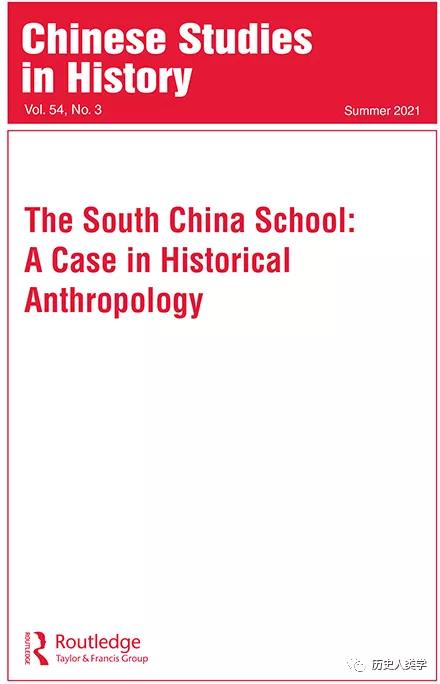新刊 | 《中国历史研究》(Chinese Studies in History)Vol.54,No.3(华南学派专辑)

he South China School: A case in historical anthropology—Editor’s introduction
Q. Edward Wang(王晴佳)
Structural processes in local societies and cultures: A dialogue between historiography and anthropology in Pearl River Delta studies
Liu Zhiwei(刘志伟)
Abstract:As a major area of dialogue between socio-economic history research and anthropology, land settlement, lineage development, worship of gods, the evolution of household registration system, and ethnic group issues all showed the dynamic process of the regional socio-cultural structure. The study of history was not only an account of people's agency in the social construction of territories, but also an examination of how historical narratives themselves were structured in the social construction of territories, and how this structure drove and constrained people's actions.
Keywords: Anthropologyethnic groupshistoryhousehold registrationlineagesregional societies
Anping temples and ritual traditions
Zheng Zhenman(郑振满)
Abstract:Examining temples and shrines in Anping, Taiwan, considering them in three groups, this article aims to reconstruct the social formation in this historical city. The first type were public temples, which had been government-sponsored temples from the Ming and Qing periods. The Tianhou (Empress of Heaven) Temple that was associated with the popular Goddess Mazu worship among the local residents. The second were territorial shrines that included Earth God Temples. The constructions of these temples registered the history of immigration in the city. The third were those that evolved from Qing military guildhalls (banbing), such as the Wangye Temple. From the Ming and the Qing to Japanese rule and postwar periods, all these temples and shrines as well as the religious activities experienced marked changes, which offer a vivid picture of the societal development in Anping during these important historical periods.
Keywords: Tianhou (Empress of Heaven) TempleGoddess Mazu WorshipEarth God TempleQing military guildhalls (banbing)
A village story and a country’s history: The case of Zhanglin and the methodology of traditional rural sociology
Chen Chunsheng(陈春声)
Abstract:A case study of Zhanglin, Guangdong, this article hopes to offer some methodological reflections on the study of Chinese rural society. First, the author believes that with respect to fact-finding, oral recollections and local written-sources as forms of collective memories are equally valuable. Second, what the researcher ought to focus is not whether the collective memories reflected historical truth, but how they were constructed and reconstructed repeatedly in different historical contexts. Third, capital and countryside, state and society relationship was not antithetical, rather, it was dynamic and entangled. And fourth, it is beneficial to take a total-history approach to examine the history of a locality and situate it in the context of regional society in order to reach a more nuanced understanding of state-society relationship.
Keywords: Zhanglinstate and society relationshiprural societycollective memoryoral sourcesTianhou (Empress of Heaven)
Folding and stretching of the historical processes—The existence and transformation of she (territorial shrine) and their significance in the studies of Chinese history
Zhao Shiyu(赵世瑜)
Abstract:She and she worship are very old traditions in Chinese society, originating from the ancient time and lasting until today. Both existed in the rites of the state and play important roles in popular daily life. As a marker of identity both for a state and for a community, she worship has been the most coherent representation of Chinese society and culture. Many have thought that she and she worship have disappeared, but through fieldwork, we found that they either continue to exist or are constantly transforming, continuously generating or reshaping themselves in the process of diverse and different steps of development in various regions in the country. By observations on living she and she worship in these regions, we may know more about the “folding” and “stretching” in the historical process in an ontological sense.
Keywords: She (territorial shrine)she worshipfolding and stretching in historyGu JiegangChinese religionChinese society
Article
On the history and historiography of the “South China School”
Wang Chuan(王传)
Abstract:The South China School is currently an influential academic school in China, and its scholarship methods and practices are worthy of attention and discussion. The formation of the South China School is rooted in the tradition of “downward-looking” and interdisciplinary scholarship since the construction of the liberal arts at Sun Yat-sen University, and is inspired by the theories and methods of Fu Yiling and Liang Fangzhong in the study of Chinese social and economic history. On this basis, the School has actively absorbed the historiographical theories of the Western annals school, and formed a common philosophy of scholarship through long-term cooperation and exchange with overseas scholars. The formation of the South China School is closely related to the changes in Chinese society and its academic trends in the last hundred years, which reflect certain common features of Chinese historiography from tradition to modernity. Exploring the formation process of this school should be of some significance for the development of contemporary Chinese historiography.
Keywords: Gu Jieganghistorical anthropologyInstitute of Philology and HistorySouth China SchoolSun Yat-sen University

